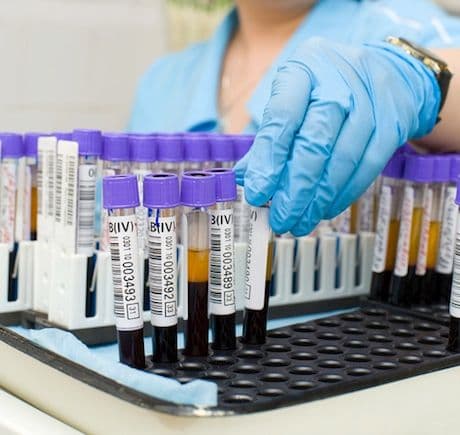Blood Test Predicts Preeclampsia Risk
Pregnancy News
Obie Editorial Team

Preeclampsia is a common potentially life-threatening pregnancy-related medical condition, affecting about 1 in 10 pregnancies. Medical complications to mother and child can be severe and lasting including diability and death. If left untreated, eclampsia may develop. Eclampsia symptoms include life-threatening seizures and mental impairment.
At present, there is no known cause of the disorder, no way to predict it with enough certainty. Once it develops, usually after the 20th week of pregnancy, it is important to carefully monitor the woman’s symptoms and prepare for a birth that may come early and may require delivery of the baby.
Preeclampsia Risk Factors
Statistical evidence suggests who might be at increased risk of developing preeclampsia:
- First pregnancy
- Mother older than 35
- Carrying multiple babies (twins, etc.)
- Family history of preeclampsia
- Chronic hypertension
- Mother’s autoimmune disorders, diabetes, kidney disease, or hypertension
- Obesity
These factors signal a woman who is at increased risk. They do not predict onset of the disorder. A recent study, however, indicates a blood test taken at intervals during pregnancy might be an accurate way of predicting the onset of preeclampsia.
Study Design
Researchers at the Mexican Institute of Social Security in Mexico City, led by Dr. Mardia López-Alarcón, invited 411 women receiving prenatal care at two medical facilities to enroll in their study of chemical changes in the blood during pregnancy to determine if any clues to impending preeclampsia could be detected. Of the invitees, 252 accepted and enrolled in the study. At the time of enrollment, each woman was no more than 20 weeks into pregnancy.
Periodic blood tests were conducted to measure the amount of five elements:
- Asymmetric dimethylarginine (ADMA, a chemical that reaches elevated levels in women diagnosed with preeclampsia)
- Folic acid (vitamin B9)
- Homocysteine (Hcy, an amino acid also found in elevated levels in women with preeclampsia)
- Vitamin B6 (often listed as pyridoxine on dietary supplement labels)
- Vitamin B12 (cobalamin)
Study Findings
Pregnancy outcomes for the study participants included:
- 179 with no pregnancy complications
- 49 developed preeclampsia
- 24 developed complications not related to preeclampsia
In the women who never developed preeclampsia, the blood concentrations of all five elements under study remained relatively constant throughout pregnancy.
In the 49 who developed preeclampsia, however, the concentrations of ADMA and Hcy rose steadily during the month before symptoms of preeclampsia emerged. This rise was present in women who developed mild symptoms of preeclampsia as well as in those who developed severe symptoms.
The researchers found that spikes in concentration levels of these two chemicals could be used as helpful predictors of preeclampsia developing the following month when concentrations in the blood reached:
- 80 nmol for ADMA (nmol is the number of molecules of the element in question)
- 1,000 nmol Hcy
According to López-Alarcón, “Of the other factors we tested, obesity and low levels of folic acid at the start of the pregnancy were also independently linked to preeclampsia.” All women in the study were receiving folic acid supplements.
Sources:
- López-Alarcón, M, et al. "Serial determinations of asymmetric dimethylarginine and homocysteine during pregnancy to predict pre-eclampsia: a longitudinal study." BJOG: An International Journal of Obstetrics & Gynaecology. Royal College of Obstetricians and Gynaecologists, 22 July 2015. Wiley Online Library. Web. 6 Aug. 2015.
- Zieve, David, and Susan Storck. "Preeclampsia." MedlinePlus. US Department of Health and Human Services, 23 Aug. 2012. US National Library of Medicine. Web. 6 Aug. 2015.







